|
De Schotse schrijver Christopher Brookmyre werd geboren op 6 september 1968 in Glasgow. Zie ook mijn blog van 6 september 2010 en eveneens alle tags voor Christopher Brookmyre op dit blog.
Uit: Not the End of the World
'All the organisers need to hear is that we're maintaining a high profile, so the visitors ain't too scared of bein' mugged, shot, gang-raped or ritually cannibalised to walk around town. That means more uniformed beat officers in the pedestrian areas, plenty of patrol cars on Ocean Boulevard and along the beach, all that shit. Ironic, really. Our purpose is to reassure them that none of their movies will come true - well, not to them at least.'
Bannon sat back on the edge of his desk. 'Think you can handle that, big guy?' he asked.
'Guess so.'
'You don't look so sure. Would you rather be out with Zabriski today, maybe? Let's see ...' He thumbed through some notes on his desk. 'Railway worker, laid off last Friday, walks into the AmTrak offices on Third at eight thirty this morning and deposits a black polythene sack in the lobby. It's one of these atrium deals, you know, with like three or four floors looking down on to the concourse. Telephones bomb warning eight thirty-five, detonates at eight forty-two. Sack contained a small but significant amount of explosive, probably basic demolition stuff. Not enough to cause any fatalities, but enough to distribute the contents of the sack approximately sixty feet in every direction, including up. Guy was, how'd they put it? a "sanitation engineer". Some of that stuff must have come all the way from Frisco before he syphoned it out the train. Four floors, Larry.'
'I'll just be getting down to the Pacific Vista, Captain. Got someone to talk to about this American Feature Film Market thing.'
'Attaboy.'
It wasn't paranoia, Larry knew. It was plain old insecurity. He'd have been suspicious of being given this AFFM 'liaison' gig anyway, simply because he was still very much the new guy, and it might well be the sort of shit detail everyone else knew to steer clear of. He knew the scene, could see the station house, smell the coffee:
'So who's gonna handle the annual fiasco at the Pacific Vista this year, then? Zabriski? Rankin? Torres? What's that? You already volunteered to escort a Klan rally through Watts? Shit. Oh, wait a minute. The new guy'll have started by then. Let's give it to him.'
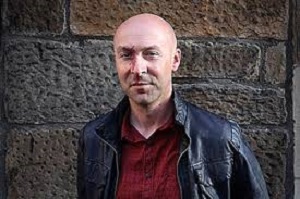
Christopher Brookmyre (Glasgow, 6 september 1968)
De Amerikaanse schrijfster Jennifer Egan werd geboren in Chicago op 6 september 1962. Zie ook mijn blog van 6 september 2010 en eveneens alle tags voor Jennifer Egan op dit blog.
Uit: Blackbox*
“People rarely look the way you expect them to, even when you’ve seen pictures.
The first thirty seconds in a person’s presence are the most important.
If you’re having trouble perceiving and projecting, focus on projecting.
Necessary ingredients for a successful projection: giggles; bare legs; shyness.
The goal is to be both irresistible and invisible.
When you succeed, a certain sharpness will go out of his eyes.
(…)
You will be tempted to pull the cord when he surrounds you with arms whose bulky strength reminds you, fleetingly, of your husband’s.
You will be tempted to pull it when you feel him start to move against you from below.
You will be tempted to pull it when his smell envelops you: metallic, like a warm hand clutching pennies.
The directive “Relax” suggests that your discomfort is palpable.
“No one can see us” suggests that your discomfort has been understood as fear of physical exposure.
“Relax, relax,” uttered in rhythmic, throaty tones, suggests that your discomfort is not unwelcome. »
* Dit verhaal werd oorspronkelijk uitgebracht als een reeks tweets op The New Yorker's Twitter-account gedurende meer dan negen dagen vanaf 25 mei 2012
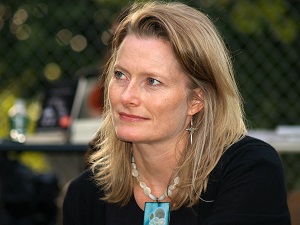
Jennifer Egan (Chicago, 6 september 1962)
De Nederlandse dichter en schrijver Aart G. Broek werd op 6 september 1954 geboren in Maasland. Zie ook alle tags voor Aart G. Broek op dit blog.
Uit:Het lichten van de jaren
Na de schroeiende hitte van de jaren achter
mij reik jij de frisse zilte wind van de Bosporus
aan. En wanneer wij ons de wangen toekeren,
jouw handen mijn schouder en rug strelen,
de armen koesterend beschermen, dan zien
mijn ogen, troebel van tranen, niets dan
schittering. Jouw ogen helen stralend. Geduldig
leer je me weer rustig ademen in de nevelen
van het sproeiende water dat de klappende
golven op de kade slaan en waarin de kleuren
van kruiden schuilen en de geuren van gebrande
noten en de streling van zuivere wol en zijde,
van shawls en tapijten, en het aroma van thee
met zo’n zoete kwetsbaarheid.
............................Ja, je blust
die vretende vlammen in m’n lijf.
Jouw tedere toewijding geneest –als eeuwen
aan masserende zorg in de marmeren badruimte
van de hamam –en brengt voor dagen het einde-
loos vergeten, terwijl mannen om ons heen elkaar
wangen toekeren, handen schouders en ruggen
strelen, ogen stralen, armen ineen rijgen…
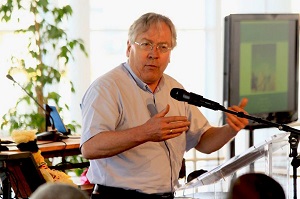
Aart G. Broek (Maasland, 6 september 1954)
De Amerikaanse schrijfster Alice Sebold op 6 september 1962 in Madison, Wisconsin. Zie ook mijn blog van 6 september 2010 en eveneens alle tags voor Alice Seebold op dit blog.
Uit: The Almost Moon
“I thanked Mrs. Castle and assured her I would handle everything.
"You know it's time," she said, turning toward me on the front stoop. "She's been in the house alone an awfully long while."
"I know," I said, and shut the door.
Mrs. Castle walked down the steps of my mother's front porch with three empty dishes of various sizes she had found in the kitchen and that she claimed to be hers. I didn't doubt it. My mother's neighbors were a godsend. When I was young, my mother had railed against the Greek Orthodox church down the road, calling its parishioners, for no reason that made sense, "those stupid Holy-Rolling Poles." But it was this congregation that had often called upon its ranks to make sure the cranky old woman who had lived forever in the run-down house got fed and clothed. If occasionally she got robbed, well, it was precarious to be a woman living alone.
"People are living in my walls," she had said to me more than once, but it was only when I found a condom lying beside my childhood bed that I'd put two and two together. Manny, a boy who occasionally repaired things for my mother, was bringing girls into her upstairs rooms. I had talked to Mrs. Castle and hired a locksmith. It was not my fault my mother refused to move.
"Mother," I said, calling the name only I, as her sole child, had the right to call her. She looked up at me and smiled.
"Bitch," she said.
The thing about dementia is that sometimes you feel like the afflicted person has a trip wire to the truth, as if they can see beneath the skin you hide in.”
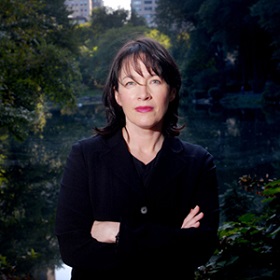
Alice Sebold (Madison, 6 september 1962)
De Frans – Amerikaanse schrijver Julien Green werd geboren op 6 september 1900 in Parijs. Zie ook ook mijn blog van 6 september 2010 en eveneens alle tags voor Julien Green op dit blog.
Uit: Moira (Vertaald door Georg Goyert)
„Seit einem Augenblick rührten sie sich nicht, standen ein paar Schritte voneinander entfernt, und Frau Dare tat so, als läse sie den Brief, den er ihr übergeben hatte; aber schon seit mehreren Sekunden wußte sie, was das Dokument enthielt, und nun beobachtete sie mit einem Seitenblick den Neuangekommenen. Ohne zu wissen weshalb, scheute sie sich, ihm offen ins Gesicht zu sehen. »Jedenfalls«, sagte sie sich zu ihrer eigenen Beruhigung, »sieht er ganz anständig aus.«
Sie betrachtete sein Gesicht von der Seite, auf das die Sonnenstrahlen fielen, die durch die Blätter der Bäume in das Zimmer glitten, und gegen ihren Willen fand sie ihn schön, wenn er auch rothaarig war. Sein flammend rotes Haar verwirrte sie und auch seine milchweiße Gesichtsfarbe, und sie beherrschte sich, damit er nicht den Widerwillen merkte, den er ihr einflößte. Daß er schwarze Augen hatte, erkannte sie nicht gleich. Er war groß, und der dunkle Anzug, der seinen langen Körper umgab, schien nicht für ihn gearbeitet. Er hatte die Arme verschränkt und sah herausfordernd hinaus auf die Straße. Zu seinen Füßen stand eine gelbe Reisetasche, deren Leder hier und da geplatzt war. Sie war derartig vollgestopft, daß sie fast einer Kugel glich.
Dann änderte er seine Haltung, streckte eine große Hand nach der Tasche aus und verrückte sie geräuschlos um ein paar Zentimeter. Er richtete sich wieder auf und steckte die Fingerspitzen in die Jackentaschen. Sein Blick war in die Ferne gerichtet.
Vielleicht merkte er, daß er beobachtet wurde. Er ließ ein paar Minuten verstreichen, dann wagte er einen raschen Blick nach Frau Dare, die immer noch las. Als hätte das lange Warten ihn dazu berechtigt, blickte er nun kühner um sich.
Das Zimmer war niedrig, und die Wände waren mit einer verblaßten Tapete bedeckt, die ins Gelbliche spielte.In der Nähe des Fensters standen sich zwei Schaukelstühle gegenüber. Sie waren durch einen kleinen Teppich voneinander getrennt, dessen blaue und malvenfarbene Wolle verblichen war. Ein runder, gestrichener Holztisch trug eine große Pflanze mit kräftigen und glänzenden Blättern. Sie bildete den Hauptschmuck des kleinen Salons. In einer Ecke stand ein Klavier, und auf dem Notenpult ein Album mit Schlagern, deren fettgedruckte Titel wie gemeines Lachen wirkten. Der junge Mann wandte den Kopf ab. »Das ist die Universität«, dachte er. »Auf der Universität ist es nun mal so.«
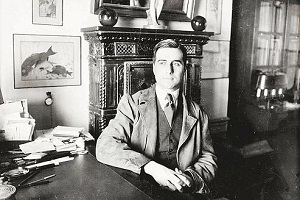
Julien Green (6 september 1900 - 13 augustus 1998)
Zie voor nog meer schrijvers van de 6e september ook mijn vorige blog van vandaag.
06-09-2014 om 14:01
geschreven door Romenu 
Tags:Christopher Brookmyre, Jennifer Egan, Aart G. Broek, Alice Sebold, Julien Green, Romenu
|

